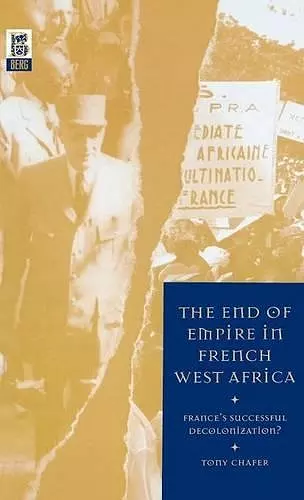The End of Empire in French West Africa
France's Successful Decolonization
Format:Hardback
Publisher:Bloomsbury Publishing PLC
Published:1st Jun '02
Currently unavailable, and unfortunately no date known when it will be back

Also available in paperback, 9781859735572 GBP17.99 (June, 2002)
This title explores the process of decolonization of France's largest colony, French West Africa. The author challenges the traditional dichotomy between "imperial" and "colonial" history, and asks was successful decolonization achieved largely by accident.In an effort to restore its world-power status after the humiliation of defeat and occupation, France was eager to maintain its overseas empire at the end of the Second World War. Yet just fifteen years later France had decolonized, and by 1960 only a few small island territories remained under French control.The process of decolonization in Indochina and Algeria has been widely studied, but much less has been written about decolonization in France's largest colony, French West Africa. Here, the French approach was regarded as exemplary -- that is, a smooth transition successfully managed by well intentioned French politicians and enlightened African leaders. Overturning this received wisdom, Chafer argues that the rapid unfurling of events after the Second World War was a complex , piecemeal and unpredictable process, resulting in a 'successful decolonization' that was achieved largely by accident. At independence, the winners assumed the reins of political power, while the losers were often repressed, imprisoned or silenced.This important book challenges the traditional dichotomy between 'imperial' and 'colonial' history and will be of interest to students of imperial and French history, politics and international relations, development and post-colonial studies.
'In the first place, it is by far the fullest and most discriminating account in English of the decolonization of France's West African empire: that is to say, of the process by which the attempts of the fourth republic to create a strong (but radically reconstructed) French Union ended with the recognition of nine independent states. Besides re-telling and re-focussing this narrative in light of new research and changing perspectives, Dr Chafer's knowledge of African sources, oral and documentary, enables him to make important original contributions to the subject. He argues convincingly that pressures from below -- notably from trade Unions and youth groups - imposed on the 'assimilationist nationalism' of the post-war leadership more radical programmes, which gave priority to the goal of independence without requiring complete severance of colonial connections. His book provides essentail clues to an understanding of the sometimes ambiguous role of the successor states in the p
ISBN: 9781859735527
Dimensions: 216mm x 138mm x 18mm
Weight: unknown
288 pages